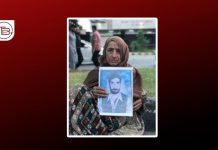Home Minister Balochistan, Ziaullah Langove said on Monday that foreign elements were behind prevailing unrest in Balochistan.
As per the reports, in a debate about the Quetta Serena hotel blast during the Balochistan Assembly session, Mr. Langove said India was sponsoring terrorist activities in Balochistan via Afghanistan.
Lawmakers from treasury and opposition benches strongly condemned the massive bomb attack in Serena hotel and termed it a conspiracy against the country and nation. The house had admitted an adjournment motion regarding the incident for debate.
“The blast was to target the CPEC”, the Home Minister said. He however vowed to bring the perpetrators of the blast to book.
It is to mention that China Pakistan Economic Corridor (CPEC) is China’s multi billion project and part of its One Belt One Road initiative, based in Balochistan’s coastal city Gwadar.
Michael Kugelman, Deputy Director and Senior Associate (South Asia) at the US-based think tank The Wilson Center, said the terror attack took place two weeks after the US charge d’affaires, Angela Aggeler, visited Gwadar to discuss investment.
Aggeler is the first US official to visit Gwadar in 15 years, and this was her second trip to Balochistan.
It is to recall that a powerful blast occurred in Serena Hotel in Quetta, the capital city of Balochistan, on Wednesday last week. Five people were killed and several injured in the attack. The attack was claimed by the Tehreek-e-Taliban Pakistan (TTP).
The Chinese Ambassador to Pakistan, Nong Rong, was staying at the hotel but wasn’t on the premises when the blast happened, Pakistan’s Interior Minister Sheikh Rashid Ahmed said Wednesday.
Sanaullah Baloch of the Balochistan National Party-Mengal, asked in the assembly on Monday that despite spending billions of rupees on law and order situations why such incidents were happening? He urged the government to take steps for addressing the issues relating to Balochistan.
The Home Minister however informed the house that an inquiry committee headed by the additional chief secretary (home) established to probe into the bombing.
The Balochistan Union of Journalists (BUJ) staged a walk-out from the house in protest over the killing of Abdul Wahid Raisani, a local reporter martyred the other night. The journalists chanted full-throated slogans against police and administration for providing safety to the journalists.
After the blast last week, according to a report by Geo TV, Sheikh Rashid blaming neighbouring country said India doesn’t want peace in Pakistan. However, regional experts made light of the accusations on l India by Pakistan, saying Pakistan has always blamed India for disturbances in the restive Balochistan, which has been the ground of a violent separatist movement for several decades.
This is not the first time that Pakistan has blamed India for orchestrating terrorist attacks in the country. Both the arch rivals have been accusing each other for terrorist attacks on both sides. In February 2019, India launched air strikes against militants in Pakistani territory in response to a suicide attack in Kashmir which killed 40 Indian soldiers. The Pakistan-based Jaish-e-Mohammad (JeM) group said it had carried out that attack.
In 2018, after an attack at the Chinese consulate in Karachi, Pakistan alleged India’s involvement. The attack was claimed by the Baloch Liberation Army (BLA), the oldest insurgent group in the region that Pakistan alleges is supported by India. The BLA is among the groups reportedly opposed Chinese investment in Balochistan.
Sharat Sabharwal, former High Commissioner of India to Pakistan, said it is not new for Pakistan to blame India. “Pakistan has always blamed India for disturbances in Balochistan when the fact is that they themselves are responsible for it because of their high-handedness in dealing with the people of Balochistan,” he added.
“It is the largest province there and rich in mineral resources, but while Pakistan exploits those, the Army continues to deal with them with a heavy hand,” he added.
Sabharwal further said that the BLA and the BRA (Baloch Republican Army), have been attacking Chinese interests in Quetta. Now it seems, he said, the TTP has also joined them, as Beijing’s influence continues to increase with infrastructure projects that began with the building of the Gwadar Port, also in Balochistan.






























